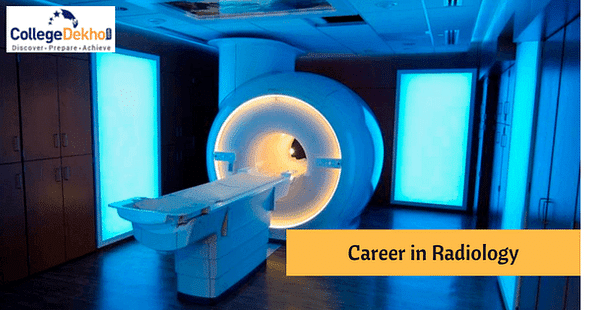Some of the popular Radiology Courses after 12th are BSc RIT, BSc Hons. and Diploma in Radiology. Click here to learn more about top radiology courses and latest update.
- Complete List of Radiology Courses in India
- List of UG Radiology Courses Available in India
- Career Scope of UG Radiology Courses in India
- List of Certificate Radiology Courses in India
- Career Scope of Certificate Radiology Courses in India
- Radiology Courses After 12th: Diploma Radiology Courses
- Eligibility Criteria for Radiology Courses in India
- Radiology Career Scope and Job Opportunities
- Salary offered to Radiologists
- Top Colleges for Radiology in India
- Radiology Courses After 12th Syllabus
- Related Articles
- Faqs

Radiology Courses after 12th include popular courses like B.Sc. (Hons.) in Medical Radiotherapy Technology, Bachelor of Radiology and Imaging Technology (BSc RIT), Diploma in Radiology/ Radiography, and Certificate in Radiology Assistant. Radiology Courses after 12th will assist candidates in picking the right Radiology Course based on their preferences and future commitments. This list of top radiology courses enables students to confidently and wisely choose the most fitting specialization that aligns perfectly with their individual requirements and aspirations. Some of the popular colleges offering top radiology courses include Shyam Institute of Engineering and Technology, CMC Vellore, Madras Christian College, and Swami Rama Himalayan University.
Radiology Courses offers a transformative journey filled with opportunities for those curious and eager to embrace their career in the field of Radiology. Exploring the fascinating world of radiology courses allows individuals to discover exciting career possibilities and visualize a bright future based on their interests and choices after Class 12th. The carefully prepared List of Radiology Courses after 12th along with its wide range of career opportunities in India will help students to make informed decisions. They can choose a career path that aligns with their passions and gives them a sense of enthusiasm to follow their dreams of becoming a radiologist with confidence.
Radiology is the study of the diagnosis of diseases with the help of medicine as well as technology. It is classified into two major fields including diagnostic radiology and interventional radiology. Radiology is one of the more popular branches of medical sciences and is a popular choice amongst medical aspirants across India. Various courses are available in Radiology that offer good job opportunities, however, the best amongst them is pursuing an MBBS course, subsequently followed by an MD course or MS course . Check this article to learn more about the Radiology Courses After 12th, eligibility criteria, admission process, and important dates.
Complete List of Radiology Courses in India
Candidates can refer to the table given below if they are interested in studying radiology courses after 12th at the different educational levels like undergraduate, postgraduate, diploma, or certificate levels.
Name of the Course | Type of Course | Duration |
|---|---|---|
Certificate in Radiography | Certificate | 6 months |
Certificate in Radiology Assistant | Certificate | 6 months |
Certificate in Radiography Diagnostic | Certificate | 6 months |
Diploma in Radiography and Radiotherapy | Diploma | 1 year |
Diploma in Radio Diagnosis | Diploma | 2 years |
Diploma in Radio-diagnostic Technology | Diploma | 2 years |
Undergraduate Degree | 3 years | |
B.Sc. (Hons.) in Medical Radiotherapy Technology | Undergraduate Degree | 3 years |
MD/MS in Radio Diagnosis | Postgraduate Degree | 3 years |
M.Sc. Radiology | Postgraduate Degree | 2 years |
Post Graduate Diploma in Radiotherapy Technology | PG Diploma | 2 years |
Post Graduate Diploma in Radio-diagnosis and Imaging Sciences | PG Diploma | 2 years |
Post Graduate Diploma in X-ray Radiography and Ultra-sonography | PG Diploma | 1 year 6 month |
List of UG Radiology Courses Available in India
The duration of undergraduate Radiology courses offered in India is 3 years. Courses like BSc RIT, BSc MRT, BSc RT and BSc MIT are a few of the undergraduate degree programme in the list of Top Radiology Courses that are offered in Indian Colleges. Candidates can refer to this list of Radiology Courses for Undergraduate Students to know more about the UG Radiology Courses Available in India.
Degree | Average Fee | Duration | Details |
|---|---|---|---|
Bachelor of Radiology and Imaging Technology (BSc RIT) | INR 40,000 to INR 1.2 LPA | 3 Years | It covers various topics such as anatomy, physiology, radiation physics, radiography techniques, and imaging procedures. |
Bachelor of Science in Medical Radiography Technology (BSc MRT) | INR 55,000 to INR 3.50 LPA | 3 Years | It teaches students about the use of medical imaging technologies, such as X-rays, CT scans, and MRI, in diagnosing and treating diseases. |
Bachelor of Science in Radiology and Imaging Technology (BSc RIT) | INR 40,000 to INR 2.5 LPA | 4 Years | The course offers students a comprehensive understanding of the principles, techniques, and applications of radiology and imaging technology. |
Bachelor of Science in Radiologic Technology (BSc RT) | INR 15,000 to INR 4 LPA | 3 Years | It focuses on the use of radiation in medical imaging, such as X-rays and ultrasound, for diagnostic and therapeutic purposes. |
Bachelor of Science in Medical Imaging Technology (BSc MIT) | INR 10,000 to INR 3 LPA | 3 Years | The program covers the basic principles of medical imaging technologies such as X-rays, CT scans, and MRI, and how they are used in diagnosing and treating diseases. |
Career Scope of UG Radiology Courses in India
Career scope for the candidate who completes his/her 3-year UG Radiology Course in India like BSc RIT, BSc MRT, BSc RT and BSc MIT are mentioned below:
Pathology assistants
Radiation protection technicians
Clinical lab technicians
CT tech/CAT scan technologist
Ultrasound technologists or Diagnostic medical sonographers
Laboratory managers/supervisors
Radiology Assistant
List of Certificate Radiology Courses in India
Radiology is a diverse field and students who are aspiring to enroll in certificate programs of Radiology must check out this list of Radiology Certificate Courses in India:
Degree | Average Fee | Duration | Details |
|---|---|---|---|
Certificate in Radiology Assistant | INR 30,000 to INR 2 LPA | 1 year | This program prepares students to assist radiologists in performing medical imaging procedures, such as X-rays and CT scans. It covers topics such as radiation safety, patient positioning, and image processing. |
Certificate in Radiography and Imaging Technology | INR 35,000 to INR 80,000 | 1 year | This program focuses on the use of radiation in medical imaging, such as X-rays and CT scans. It covers the basic principles of radiology, imaging techniques, and radiation safety. |
Certificate in Computed Tomography (CT) Scan Technology | INR 27,500 to INR 65,000 | 6-month to a 1-year | This certificate program trains students to perform CT scans and analyze the results. It covers the principles of CT scan technology, anatomy and physiology, and patient care. |
Certificate in Magnetic Resonance Imaging (MRI) Technology | INR 10,000 to INR 40,000 | 6-month to a 1-year | It focuses on the use of MRI in medical imaging. It covers the principles of MRI technology, patient positioning, and safety. |
Certificate in Ultrasonography | INR 20,000 to INR 60,000 | 6-month to a 1-year | This is a certificate program that trains students to perform ultrasound scans for diagnosing medical conditions. It covers the principles of ultrasound technology, anatomy and physiology, and image interpretation. |
Career Scope of Certificate Radiology Courses in India
If not necessary for candidates to pursue a degree in Radiology to have a career in Radiology. If a student enroll and completes a certificate course of Radiology, then he/she can explore the following career in radiology after completing their certificate-level studies.
Radiology administration
Radiology management
Radiology information technology
Radiology diagnostic imaging
Radiology Courses After 12th: Diploma Radiology Courses
Candidates pursue Top Radiology Courses for various reasons like the advancement of knowledge and skills, varied career opportunities, research, and other global opportunities. Here is the list of diploma radiology courses that candidates can choose to pursue after completing higher secondary education.
Course Name | Average Course Fee | Duration | Details |
|---|---|---|---|
Diploma in Radiodiagnosis (DMRD) | INR 90,000 to INR 6.5 LPA | 2 years | This diploma trains students in the use of imaging technologies, such as X-rays, CT scans, and MRI, for diagnostic and therapeutic purposes |
Diploma in Radiology Therapy (DRT) | INR 50,000 to INR 1.5 LPA | 2 years | This diploma enables the candidates to use ionizing radiation to treat diseases tumors and cancers |
Diploma in Medical Radiology and Electrology (DMRE) | INR 1,00,000 to INR 9 LPA | 1.5 years to 2 years | This diploma program teaches students about the use of medical imaging technologies and electrology in diagnosing and treating diseases |
Eligibility Criteria for Radiology Courses in India
Aspirants who wish to pursue any degree programme from the best radiology courses list must ensure that they qualify for the requisite eligibility criteria for the respective radiology courses. Each college offering Radiology courses will determine its eligibility criteria, however, aspirants can check out the general eligibility criteria for different Radiology courses in India, which have been defined below:
Course | Eligibility Criteria |
|---|---|
Certificate Radiology Courses |
|
Undergraduate Radiology Courses |
|
Radiology Career Scope and Job Opportunities
Radiology is a branch of medical science that is highly in demand due to its high efficiency in the diagnosis of diseases. As it is one of the only few proven medical diagnostic methods that enable doctors to detect diseases inside the human body, trained and qualified Radiologists are required in all medical centres and hospitals. Following are some of the job profiles that you can look for as a better career in Radiology
Designation | Average Salary Scale |
|---|---|
Radiology Technician | INR 2 LPA to INR 5 LPA |
Diagnostic Medical Sonographer | INR 1.5 LPA to INR 4 LPA |
Radiology Technologist | INR 3 LPA to INR 8.5 LPW |
CT Scan Technologist | INR 4.5 LPA to INR 10 LPA |
Radiographer | INR 1.8 LPA to INR 4.8 LPA |
Ultrasound Technician | INR 2.2 LPA to INR 5.6 LPW |
Radiology Nurse | INR 6 LPA to INR 11 LPA |
Radiology Assistant | INR 2.5 LPA to INR 5.5 LPA |
Radiologist | INR 7 LPA to INR 15 LPA |
MRI Technician | INR 3.1 LPA to INR 7 LPA |
Popular Areas of Employment After Radiology Courses
With the rapid growth in healthcare and the requirement for high-tech medical facilities, Radio Diagnostic Centres have also emerged as one of the most successful businesses in the healthcare industry. These centers provide medical diagnostic services to hospitals that lack well-equipped and proper radiological departments. With this massive step up in urbanization and numerous hospitals being established in the country, there is a dearth in the number of skilled and qualified professionals in Radiology. The medical centres in India open up a lot of scope and jobs for radiology aspirants. Individuals are hired by these radiological centres at different levels (assistants, doctors, etc.). These days, tier 1, and tier 2 cities, as well as big towns, have diagnostic centers, offering various job opportunities to students. Some of the popular areas of employment for graduates in Radiology are as follows:
Government and Private Hospitals
Diagnostic Centres
Government and Private Medical Laboratories
Super-Speciality Hospitals
Nursing Homes
Also Read: BAMS vs BHMS: Eligibility, Job Opportunities and Salary
Salary offered to Radiologists
The annual packages offered to a radiologist would be determined based on various factors, including the academic qualifications of the candidate, the area of specialisation as well as the area of employment as well. Therefore, while we can estimate roughly the annual packages that are offered to graduates in the field of radiology, the actual pay scale will differ. Check out the annual pay packages of a radiologist in India.
Qualification | Average Initial Salary (Annual) | Median Salary (Annual) |
|---|---|---|
Radiology Certificate | INR 1 LPA - INR 2 LPA | INR 1.7 LPA - INR 2.5 LPA |
B.Sc Radiology | INR 2.5 LPA - INR 3.4 LPA | INR 6 LPA - INR 7.7 LPA |
Also Read: New World Specialisations in MBA: Colleges and Job Scope
Top Colleges for Radiology in India
Check out the list of top Radiology colleges in India, offering a host of courses at different levels.
Name of College | Courses Offered | Annual Course Fee (Approx) |
|---|---|---|
B.Sc Radiology and Imaging Technology M.Sc Radiology | INR 60,000 (B.Sc) INR 80,000 (M.Sc) | |
B.Sc Radiotherapy Technology MD Radiodiagnosis Diploma in Radiodiagnosis Technology | INR 23,000 INR 1.4 LPA - INR 1.8 LPA (PG Medical Courses) | |
B.Sc Radiology | INR 73,000 | |
MD Radiodiagnosis Diploma in Medical Radio-Diagnosis | - | |
B.Sc in Medical Radiography & Imaging Technology M.Sc Radio Imaging Radiography PG Diploma in Radio-Diagnosis | INR 72,000 (B.Sc) INR 1.3 LPA (M.Sc) | |
MD in Radiodiagnosis M.Sc Med.Tech. Radiology | - | |
MD in Radiodiagnosis B.Sc Med. Tech. Radiography and Imaging Diploma in Medical Radiodiagnosis | - | |
Centurion University of Technology and Management Bhubaneswar | B.Sc in Radiology M.Sc Radiology & Imaging Technology Diploma in Radiology and Imaging Technology Certificate in Radiology and Imaging and Technology | INR 90,000 (B.Sc) INR 80,000 (M.Sc) INR 40,000 (Diploma) INR 30,000 |
B.Sc Medical Radiography and Imaging Technology M.Sc Medical Radiography and Imaging Technology MD Radiology Diploma in X-Ray Technician | INR 91,800 (B.Sc) INR 54,000 (M.Sc) INR 39,900 (MD) ₹41,400 (Diploma) | |
B.Sc Radio-Imaging Technology M.Sc Radio-Diagnosis Diploma in Radio-Imaging Technology | INR 75,000 (B.Sc & Diploma) |
The course fees that have been mentioned above are approximate numbers and the actual course fees may vary a little. If you are interested in taking admission in any one of the Radiology colleges or courses in India, then you can fill out the Common Application Form , available on our website. For more information about Radiology Colleges in India , call on our toll-free number 1800-572-9877 and avail free counselling.
Radiology Courses After 12th Syllabus
Some of the major subjects included in the Radiology Courses After 12th are listed below:
Radiation Hazards and their Protection
Radiological Procedures
Conventional Radiology Equipment
Human resources
Management of healthcare Organisations
Environmental science
Biostatistics
Nuclear medicine
PET scans
Pathology
In conclusion, the field of radiology in India offers a variety of undergraduate, postgraduate, diploma, and certificate courses for students who are interested in pursuing a career in this exciting and dynamic field. With the growing demand for skilled radiology professionals, these courses offer students comprehensive training in various imaging techniques and medical technologies that are necessary for diagnosing and treating various medical conditions. As the healthcare industry continues to evolve, the demand for skilled radiology professionals is likely to grow, making this an excellent career choice for those interested in the field.
Related Articles
Click on the links given below to learn more:
Learn More About Operation Theatre Technology Courses in India | Check out the list of Highest Paying Paramedical Jobs in India |
|---|---|
Check out the Differences Between Optometry and Physiotherapy |
For more information on the List of Radiology Courses and its Career scopes in India, stay tuned at CollegeDekho!
FAQs
Post Graduate Diploma in Medical Radio Diagnosis course requires physical presence and a lot of hands-on-work which might be missed out if distance learning is pursued. There are a few instituted offering the programme, but students are advised to pursue this course in-person only.
To enter Radiology, one needs to have a bachelor's degree in Radiology and a valid license approved by the government of India. This will open doors to numerous job opportunities as a Radiologist. One can apply to different private and government diagnostic centres in order to kickstart his/her career in radiology.
Any individual seeking a career in Radiology must complete formal medical graduation in order to become a radiologist. One has to complete a 5-year medical degree only then one can pursue a master's in Radiology.
With the increasing number of diagnostic centres and demand for skilled Radiologists in the country, opportunities in the field of Radiology are vast. A certified radiologist can work in any private or government diagnostic centre according to the need.
Pursuing a course in radiology is not easy. It takes a lot of dedication, perseverance, and hard work. medical students often face difficulty coping with the pressure. Therefore it's important to make sure becoming a radiologist is what you really wish for before you commit.
A candidate must have completed MBBS as well as the mandatory internship to get admission to MD Radiology and MS Radiology courses. It is a 2 years regular course. Students can choose from different specialisations in Radiology such as medical technology radiology, radio-imaging, Imaging Technology, radiography, radio-diagnosis, etc.
No, B.Sc Radiology is not a doctorate degree. It is an undergraduate course after completing which one can take up a job as a Technician in operating machines but can become a doctor only after completing the MBBS course. To become a Doctor in Radiology, one needs to have an MBBS Degree.
B.Sc Radiology does not require a NEET score to pursue a career in radiology. However, If someone has to do a masters, he/she has to appear for NEET PG 2022 for a specialisation in radiology.
A student who has completed class 12th with Science and biology as mandatory subjects can apply for admission in B.Sc Radiology seeking a career in Radiology. A graduate in radiology can work as a Lab technician, Radio Imaging Lab Assistant, and equipment operator in any radio diagnostic centers.
There is no specific age requirement to pursue a career in radiology. However, minimum 17 years of age is required to get admission in any radiology course which is compulsory to become a radiologist.
A Radiologist having a masters degree in radiology earns between around 40 - 50 thousand initially depending on the hospital or the radio laboratory. The annual average salary of a Radiologist in India is INR 10.0 Lacs.

















Similar Articles
Affiliation of Sinhgad Dental College Revoked
NEET UG 2026 Application Process to Begin Soon
NEET PG Seats in India: Check State-wise NEET PG 2026 Seat Matrix
INI CET Seat Matrix 2026 - Seat Reservation Category Wise
NEET UG 2026 Formula List: What Toppers Revise One Day Before Exam
Medical Certificate Format for Students: Find Samples and Download Forms